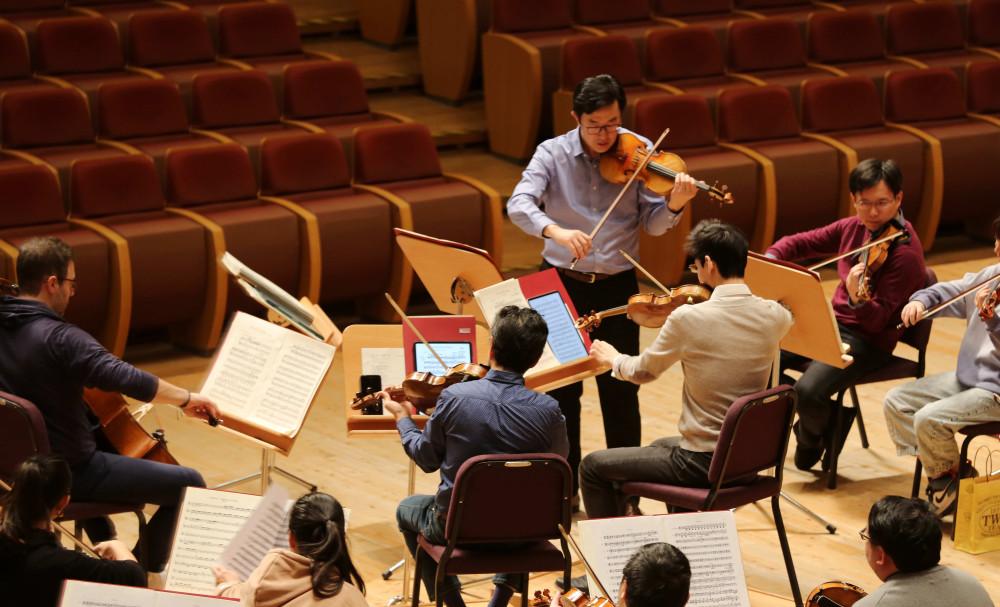
As the first music brand initiated by music director Yu Long after taking office, the "Shanghai New Year Concert" has not only entered the list of "must-hear" for Shanghai music fans since its premiere in 2009, but also become an important channel for listeners to obtain a sense of life ritual and artistic happiness. The "2022 Shanghai New Year Concert" held on the evening of December 31 this year unexpectedly removed the central podium of the stage, and the Shanghai Symphony Orchestra was led by the Shanghai Quartet, the artist-in-residence this season, presenting a pioneering performance for the audience.
In terms of repertoire, the dance music tradition of Vienna, the birthplace of the New Year's concert, is followed by the Shanghai Quartet, which has "already entered the ranks of world-class chamber music groups", and the first violin Li Weigang plays the role of conductor. "This is the first time we've led a band of more than 80 people, and I'm curious to see how this format will work, after all, it hasn't been on the domestic stage yet." As the "second generation" of the Shanghai Symphony, Li Weigang is both worried and full of expectations for this pilot.
The superior strength of the "Shanghai Quartet + Shanghai Symphony Orchestra" makes this breakthrough attempt more feasible. Both music brands, both named "Shanghai", have joined forces to explore the many possibilities of classical music, while also sending greetings from Shanghai to the world in the international trend of New Year's concerts.
The Shanghai Symphony staged a round dance, blowing the "Viennese" wind with the Berlin Philharmonic
As the originator of the New Year's concert that is now popular all over the world, the Vienna New Year's Concert in 1939 laid the foundation for the later performance of the Strauss family's round dance, which was a three-beat dance that people could not help but dance with, and soon conquered people of different skin colors and cultural backgrounds, and reached hundreds of millions of audiences through global live broadcasting. This also includes Chinese audiences, and these cheerful dance music has also become the earliest recognition of the New Year's concert in China.
The Shanghai Symphony Orchestra chose to celebrate the New Year with the familiar "Viennese Melody" in this New Year' still plagued by the epidemic, and staged the signature repertoire of many Viennese New Year concerts, such as the "Sound of Spring" round dance, the "plucked string" polka, the "Thunder" fast polka, and the "Blue Danube" round dance. Coincidentally, this year's New Year's Concert by the Berliner Philharmoniker will also feature a Strauss family dance under the theme of "Tribute to Vienna". In addition, the "Shanghai New Year Concert" will present the "Gold and Silver Round Dance" that the Hungarian composer Lechal was invited to compose for the carnival ball, as well as Shostakovich's prestigious "Second Round Dance".
The four musicians of the Shanghai Quartet will also be played separately. Among them, the first violin Li Weigang and the viola Li Honggang brothers will each bring their bands to perform Beethoven's "Second Romantic Song in F Major" and Bruch's "Romantic Song in F Major". Cello Nicholas Savaras will create a bohemian atmosphere for the audience, presenting Dvořák's "G minor Whirling". Yu Xiang, the second violinist of the new member, will bring one of the most famous rhapsodies of Italian composer Monti, "Chardas". In addition to Western classics, the audience will also feel the Chinese style blowing from the grassland that night - the "Pastoral Song" led by Yu Xiang, an Inner Mongolian, is composed by Chinese composer Sha Hankun based on the folk songs of Inner Mongolia, and depicts a beautiful picture of the vast grassland with the melody of the pastoral pastoral style.
The Shanghai Quartet took the lead conductor and unleashed its musical nature
Not long ago, on December 22, the Shanghai Quartet, a group that has been cutting through thorns on the international stage for more than 30 years, presented its Shanghai debut after returning to China for its hometown audience. The refinement and precision of the long-experienced chamber music performance not only made the Shanghai Quartet win a large number of fans, but also added confidence to the four musicians to lead the Shanghai New Year Concert, and made this unique New Year performance more audible.
For the form of leading conductor of violin and ensemble groups, Li Yanhuan, a famous music critic in Shanghai, expressed his expectations. "In fact, the Vienna New Year's Concert was conducted and performed by the concertmaster for a long time, and the effect was very good. Led by the Shanghai Quartet, the concert led the band to present classic works in a more chamber-based manner, perhaps allowing both the player and the audience to perceive the music they are already familiar with from a different perspective. ”
In fact, today's international music scene is also testing the waters of "no conductor stage" performances. At this year's Lucerne Festival, pianist Wang Yujia performed two concerts with the Lucerne Festival Orchestra and mahler Chamber Orchestra, which were completed by the pianist leading or principal. Veteran music critic Christian Verhagen praised the Lucerne Festival's attempt in the Swiss "New Zurich Times", saying that it "conveys a 'heart-changing' perspective".
Of course, conducting is still indispensable in performances, as the soloist or lead orchestra "alternative" conductor has a limited repertoire. However, as far as fans feel when they see the "Shanghai New Year Concert" program list, "it is a new thing to be able to hear and witness a concert of a symphony orchestra without a traditional conductor on the spot."
Courtesy of the Shanghai Symphony Orchestra
Author: Jiang Fang
Editor: Tong Weijing
Editor-in-Charge: Liu Qing
*Wenhui exclusive manuscript, please indicate the source when reprinting.